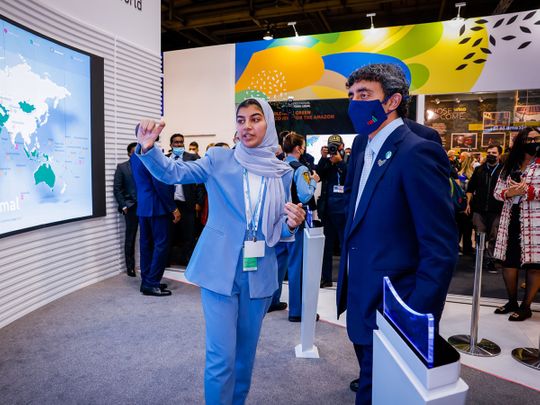
Glasgow: Sheikh Abdullah bin Zayed Al Nahyan, Minister of Foreign Affairs and International Cooperation, and Head of the UAE delegation to COP26, attended on Wednesday the official launch ceremony of the Energy Transition Accelerator Financing (ETAF) Platform, a new global climate finance facility to accelerate the transition to renewable energy in developing countries.
The UAE and the International Renewable Energy Agency (IRENA) on Wednesday announced the launch of the global platform on the sidelines of COP26, in Glasgow.
The UAE committed $400 million in funding provided by the Abu Dhabi Fund for Development (ADFD) toward the platform’s goal of securing a minimum of US$1 billion in total funding.
Sheikh Abdullah said: “The new ETAF platform reinforces our long-standing commitment to support positive climate action in developing and vulnerable countries.
"As a signatory to the United Nations Framework Convention on Climate Change (UNFCCC), the UAE fundamentally believes, we must work together globally, in partnerships, to mitigate the effects of climate change.
“The UAE is proud to act decisively in pushing forward a responsible, sustainability-led agenda, and in assisting other nations to benefit from the significant advantages of renewable energy.”
Dr. Sultan bin Ahmed Al Jaber, Minister of Industry and Advanced Technology and UAE Special Envoy for Climate Change, said: “The UAE views development aid and climate action as powerful catalysts for economic growth, both domestically and internationally.
“Today’s announcement will help to advance the economies of partner countries by providing reliable, low-cost renewable energy for businesses, industry, and homes. We are proud of this significant new contribution by the Abu Dhabi Fund for Development to accelerate climate action and deliver immediate economic benefits in the process.
“This is the kind of initiative that combines partnership, policy and finance to create tangible progress and it is this focus on practical results that has motivated the UAE to offer to host COP 28 in 2023.”
Through co-financing, ETAF will aim to mobilise an additional US$2 billion in energy transition investments, targeting a total deployment of 1.5 GW of clean renewable energy generation and storage by 2030.
ETAF will be managed by IRENA from its Abu Dhabi headquarters, capitalising on the UAE’s climate finance market and renewable energy innovation infrastructure. The new accelerator platform will help mitigate investment risks and finance renewable energy projects in developing countries that may otherwise struggle to secure sufficient capital.
Francesco La Camera, the Director-General of IRENA, said: “We have reached a defining moment in our generation’s efforts to put our economies and our environment on a path to stability, resilience and shared prosperity.
“The energy transformation is the most attractive and effective tool we have to achieve that. This new investment platform reflects the UAE’s commitment to shaping a sustainable future, and IRENA’s efforts to serve its over 180 member countries as an indispensable energy transformation partner.
“We encourage multilateral development banks, international financial institutions, governments, and private sector actors to join us in bolstering sustainable development efforts.”
The new UAE-IRENA partnership to establish the ETAF platform builds on the long-term collaboration between IRENA and ADFD, which includes seven cycles of the US$350 million IRENA-ADFD Project Facility. Between 2013 and 2020, the facility financed 26 projects in Asia, Africa, and Latin America, notably including Small Island Developing States
Mohammed Saif Al Suwaidi, Director-General of ADFD, said, “IRENA and ADFD have an excellent track record working together on the development of major renewable energy projects in developing markets. These projects have significant environmental, economic and social impact that is transformational for countries and their people. Through this new platform, we seek to bring together finance and development partners from around the world under a shared vision to combat climate change.”
“Given the essential role that renewable energy projects play in achieving sustainable development for developing countries, ADFD has committed to allocating US$400 million until 2030 to enable accelerated deployment. These projects will have a great impact on local communities, helping beneficiary countries to achieve greater economic and social development,” he added.
ADFD has contributed to financing to a number renewable energy projects in developing countries, in addition to funding the UAE’s initiatives to support renewable energy projects in island states, including the IRENA/ADFD Project Facility, UAE-Caribbean Renewable Energy Fund (UAE-CREF), and the UAE-Pacific Partnership Fund.
In total to date, ADFD has worked with a number of clean energy partners and governments around the world to support the development of 90 renewable energy projects in 65 countries that have the capacity to generate more than 9,000 megawatts of electricity. With the new ETAF contribution, ADFD’s total financing for renewable energy projects now stands at US$1.8 billion.
The ETAF platform will source projects on an ongoing basis, supplemented by calls for proposals aligned with Paris Agreement and SDG milestones. Investment-ready projects identified under IRENA’s existing Climate Investment Platform will also represent a notable pipeline.
Moreover, Sheikh Abdullah visited the UAE’s pavilion at COP26, and commended the efforts of the pavilion team and the delegation members and the keenness they showed to highlight the UAE’s significant regional and global role in the field of climate action, especially since the UAE applied to host COP28 in 2023.
During his visit to the pavilion, he met with a group of Emirati youth, and highlighted their pivotal role in adopting innovative solutions to deal with the fallout of climate change, and the active and important role they are expected to play at COP28.
He also urged youth to enhance their contributions to climate action, noting that joint action, cooperation and constructive partnerships are the main course of action for tackling climate change.
Furthermore, Sheikh Abdullah underlined the importance of strengthening international cooperation and coordination in dealing with the repercussions of climate change, to drive environmental preservation efforts and ensure a prosperous, sustainable future for generations to come.
He also highlighted the UAE’s keenness to enhance its cooperation with other countries and support the efforts of the international community to tackle climate change and contain its fallout, and praised the UK’s hosting of COP26, which saw a huge turnout.






